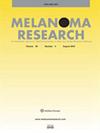Combined PDE4+MEK inhibition shows antiproliferative effects in NRASQ61 mutated melanoma preclinical models.
IF 1.5
4区 医学
Q3 DERMATOLOGY
引用次数: 0
Abstract
Upregulation of phosphodiesterase type 4 (PDE4) has been associated with worse prognosis in several cancers. In melanomas harboring NRAS mutations, PDE4 upregulation has been shown to trigger a switch in signaling from BRAF to RAF1 which leads to mitogen-activated protein kinase pathway activation. Previous in vitro evidence showed that PDE4 inhibition induced death in NRASQ61mut melanoma cells and such a strategy may thus be a relevant therapeutic option in those cases with no molecular targeted therapies approved to date. In this study, we generated patient-derived xenografts (PDX) from two NRASQ61mut melanoma lesions. We performed ex vivo histoculture drug response assays and in vivo experiments. A significant ex vivo inhibition of proliferation with the combination of roflumilast+cobimetinib was observed compared to dimethyl sulfoxyde control in both models (51 and 67%). This antiproliferative effect was confirmed in vivo for PDX-1 with a 56% inhibition of tumor growth. To decipher molecular mechanisms underlying this effect, we performed transcriptomic analyses and revealed a decrease in MKI67, RAF1 and CCND1 expression under bitherapy. Our findings strengthen the therapeutic interest of PDE4 inhibitors and support further experiments to evaluate this approach in metastatic melanoma.PDE4+MEK联合抑制剂在NRASQ61突变黑色素瘤临床前模型中显示出抗增殖作用。
4型磷酸二酯酶(PDE4)的上调与多种癌症的预后恶化有关。在携带 NRAS 基因突变的黑色素瘤中,PDE4 的上调已被证明会引发信号从 BRAF 到 RAF1 的转换,从而导致丝裂原活化蛋白激酶通路的激活。以前的体外实验证据表明,PDE4抑制可诱导NRASQ61突变黑色素瘤细胞死亡,因此,在迄今为止尚未批准分子靶向疗法的病例中,这种策略可能是一种相关的治疗选择。在这项研究中,我们从两种 NRASQ61 突变黑色素瘤病变中生成了患者衍生异种移植物(PDX)。我们进行了体外组织培养药物反应测定和体内实验。在两种模型中,与二甲基亚砜对照组相比,罗氟司特+科比美替尼联合用药都能明显抑制体外增殖(51%和67%)。这种抗增殖作用在 PDX-1 的体内得到了证实,肿瘤生长抑制率为 56%。为了破译这种效应的分子机制,我们进行了转录组分析,结果显示,在双硫醚疗法中,MKI67、RAF1 和 CCND1 的表达均有所下降。我们的研究结果增强了 PDE4 抑制剂的治疗效果,并支持在转移性黑色素瘤中对这种方法进行进一步的实验评估。
本文章由计算机程序翻译,如有差异,请以英文原文为准。
求助全文
约1分钟内获得全文
求助全文
来源期刊

Melanoma Research
医学-皮肤病学
CiteScore
3.40
自引率
4.50%
发文量
139
审稿时长
6-12 weeks
期刊介绍:
Melanoma Research is a well established international forum for the dissemination of new findings relating to melanoma. The aim of the Journal is to promote the level of informational exchange between those engaged in the field. Melanoma Research aims to encourage an informed and balanced view of experimental and clinical research and extend and stimulate communication and exchange of knowledge between investigators with differing areas of expertise. This will foster the development of translational research. The reporting of new clinical results and the effect and toxicity of new therapeutic agents and immunotherapy will be given emphasis by rapid publication of Short Communications. Thus, Melanoma Research seeks to present a coherent and up-to-date account of all aspects of investigations pertinent to melanoma. Consequently the scope of the Journal is broad, embracing the entire range of studies from fundamental and applied research in such subject areas as genetics, molecular biology, biochemistry, cell biology, photobiology, pathology, immunology, and advances in clinical oncology influencing the prevention, diagnosis and treatment of melanoma.
 求助内容:
求助内容: 应助结果提醒方式:
应助结果提醒方式:


